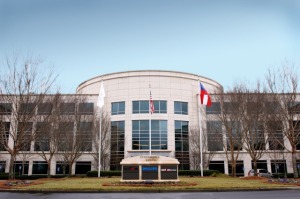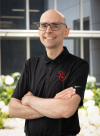Philips Opens Advanced Medical Equipment Service Facility
by Barbara Kram, Editor | February 22, 2010

Philips Custom Care Solutions
Center, Alpharetta, Georgia
Center, Alpharetta, Georgia
Philips Healthcare has just opened its Customer Care Solutions Center integrating more than 200 biomedical engineers and technicians, dozens of clinical staff, and state-of-the-art electronic connectivity to customers.
The Alpharetta, Georgia center includes a high bandwidth network that enables faster downloads of data and image information to speed resolution time and help keep hospital technology operational. On average, the center handles 2,500 inquiries a day; more than a third of those are able to be resolved remotely. The facility serves North America, South America and Latin America.
"Healthcare facilities are trying to improve their utilization on equipment, such as cardiac cath lab, and uptime becomes critical if they are going to meet the utilization target," said Erwin R. Thomas, Senior Director of the Philips Customer Care Solutions Center. "They want to know-- if I have a problem can you fix me remotely? What they are really asking is, do I need to reschedule my patients? Our goal is within 15 minutes to tell them if we can absolutely fix them and give them a time frame. Communication is the critical element."
The center supports Philips' entire medical technology portfolio including health informatics, PACS, CT, MRI, nuclear medicine, PET, X-ray, interventional, ultrasound, patient monitoring and cardiac care.
Service can be offered at a customer's request, but often the medical equipment itself sends an alert to the center and issues can be addressed or fixed remotely before the customer is even aware of a problem. Today's medical technology incorporates sophisticated self-diagnostics that track usage, anticipate problems, and identify trends in equipment functioning.
"We have 'phone home' capabilities on our machines, which are looking at key parameters in our system. If those parameters are not on track or are on the upper or lower specification limit, the machine will 'phone home.' It goes into our automatic customer interface device and routes that alert to the right engineer, technician or clinical specialist, depending on the modality," Thomas said. In this way, many problems can be averted before they manifest themselves through the anticipatory diagnostic capabilities of the equipment.
Other calls come in from people rather than machines if customers have a technical or clinical issue or question. Here again, remote diagnostics help support the service plan.
"If we can resolve it remotely of course we do that. If we can't resolve it remotely, we diagnose it remotely, then order the parts so that the field engineer will go to one of our forward stocking locations, pick that part up, go to the customer site and fix it. Or they meet the part the next day if we have to ship it from our centralized shipping location," Thomas said.
The Alpharetta, Georgia center includes a high bandwidth network that enables faster downloads of data and image information to speed resolution time and help keep hospital technology operational. On average, the center handles 2,500 inquiries a day; more than a third of those are able to be resolved remotely. The facility serves North America, South America and Latin America.
"Healthcare facilities are trying to improve their utilization on equipment, such as cardiac cath lab, and uptime becomes critical if they are going to meet the utilization target," said Erwin R. Thomas, Senior Director of the Philips Customer Care Solutions Center. "They want to know-- if I have a problem can you fix me remotely? What they are really asking is, do I need to reschedule my patients? Our goal is within 15 minutes to tell them if we can absolutely fix them and give them a time frame. Communication is the critical element."
The center supports Philips' entire medical technology portfolio including health informatics, PACS, CT, MRI, nuclear medicine, PET, X-ray, interventional, ultrasound, patient monitoring and cardiac care.
Service can be offered at a customer's request, but often the medical equipment itself sends an alert to the center and issues can be addressed or fixed remotely before the customer is even aware of a problem. Today's medical technology incorporates sophisticated self-diagnostics that track usage, anticipate problems, and identify trends in equipment functioning.
"We have 'phone home' capabilities on our machines, which are looking at key parameters in our system. If those parameters are not on track or are on the upper or lower specification limit, the machine will 'phone home.' It goes into our automatic customer interface device and routes that alert to the right engineer, technician or clinical specialist, depending on the modality," Thomas said. In this way, many problems can be averted before they manifest themselves through the anticipatory diagnostic capabilities of the equipment.
Other calls come in from people rather than machines if customers have a technical or clinical issue or question. Here again, remote diagnostics help support the service plan.
"If we can resolve it remotely of course we do that. If we can't resolve it remotely, we diagnose it remotely, then order the parts so that the field engineer will go to one of our forward stocking locations, pick that part up, go to the customer site and fix it. Or they meet the part the next day if we have to ship it from our centralized shipping location," Thomas said.
1(current)



